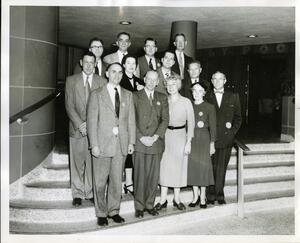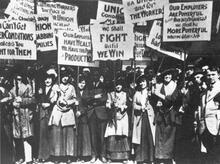Theresa Wolfson
Theresa Wolfson’s career as a labor activist and educator empowered students and workers alike. Wolfson began as an investigator for wage standards in the garment industry and a field agent for the National Child Labor Committee. Later, as executive secretary of the New York Consumer’s League, she lobbied for minimum wage and eight-hour workday legislation. In 1924, she became education director for the International Ladies Garment Workers Union and wrote her PhD dissertation on barriers to organizing women workers. In 1929, she became a professor at Brooklyn College, where she taught labor economics until her retirement in 1967. In 1957, Wolfson was honored with the John Dewey Award of the League for Industrial Democracy for her long history of mediating industrial disputes.
Theresa Wolfson, economist and educator, taught at Brooklyn College from 1929 until her retirement in 1967. A prolific writer, she published in the fields of labor economics and industrial relations. As early as 1916, Wolfson studied barriers to the advancement of women in the workplace and the unequal treatment of women within trade unions. Because she cared about the education of workers as well as of college students, she taught adult students for the educational department of the International Ladies Garment Workers Union (ILGWU) and Headgear Workers Union (1921–1927); and at the Summer School for Office Workers (held 1925–1936, 1949 at Bryn Mawr, Oberlin, Northwestern, and in Columbus, Ohio); and, after retiring from Brooklyn College, at the continuing education program at Sarah Lawrence College.
Education and Activism
Born in Brooklyn, New York, on July 19, 1897, Theresa Wolfson was the eldest child and only daughter of Adolph and Rebecca (Hochstein) Wolfson. Her brother Martin became an actor; her brother Victor became a playwright and novelist. Victor Wolfson’s My Prince! My King! (1962) is a fictionalized account of the family.
Wolfson attended Eastern District High School in Brooklyn, and then earned her B.A. from Adelphi College (1917). While at Adelphi, she helped organize a chapter of the Intercollegiate Socialist Society (later the League for Industrial Democracy). During the summer of her junior year, she began her long career in labor relations by investigating wage standards in New York City’s garment industry. She was a health worker in New York City from 1917 to 1918. From 1918 to 1920, as a field agent for the National Child Labor Committee, she investigated child labor in North Carolina, Arkansas, Michigan, Louisiana, and Oklahoma. From 1920 to 1922, as executive secretary of the New York State Consumers League, Wolfson lobbied for minimum wage and eight-hour-day legislation.
Wolfson’s 1922 to 1924 studies of posture, lighting, and fatigue in the garment factories of New York City led to her M.A. from Columbia University in 1923. From 1925 to 1927, she directed education at the Union Health Center of the ILGWU. The Woman Worker and the Trade Unions, her Ph.D. dissertation (Brookings Institution, 1926), examined barriers to organizing women workers. It was published in 1926.
Wolfson’s first marriage, to Iago Galdston on July 19, 1920, ended in divorce in 1935. Galdston was beginning a career in public health when he and Wolfson met. Later, he worked in psychiatry at the Union Health Center of the ILGWU. Galdston and Wolfson had two children: Richard (b. 1926) and Margaret Beatrice (b. 1930), who stayed with Wolfson after the divorce. In 1938, Wolfson married Austin Bigelow Wood, professor of psychology at Brooklyn College, and they were separated only by her death in 1972.
Jewish Identity and Academia
Wolfson’s Jewish background helps explain the importance she always placed on education and training. In her Ph.D. dissertation, when discussing cultural influences on the psychology of women workers in the United States, she writes: “The patriarchal Jew would have his daughters helpmates to their mothers in the home. Education and training are given the sons, discipline and housework, the daughters. In Russia, however, Jewish families were compelled to change their ideas about women’s work. The revolutionary movements of that country fed upon the idealism and enthusiastic activity of these same Jewish daughters who became self-supporting and economically independent.” As Wolfson’s parents had immigrated to the United States from Russia in 1894, her observations may stem in part from her own experiences. Wolfson also published the article “Jews in Labor and Industry” in 1928. Aside from these references to her background, Judaism does not seem to have played a dominant role in her life. Although her spiritual strength is mentioned repeatedly in tributes and eulogies Judaism is mentioned only in terms of her parents’ immigrant status.
In 1928, Wolfson joined the faculty of the Brooklyn branch of Hunter College, which later became Brooklyn College. As a pioneer member of the Brooklyn College faculty, she helped with curriculum design and departmental organization. She taught graduate and undergraduate courses in labor economics, served on numerous committees over the years, and chaired committees on student activities (1939–1941), student aid (1943–1944), Honors Day (1944–1946), and tenure. While Wolfson was still alive, her students established a collection of books on labor-management relations at Brooklyn College Library in her honor. After her death, an annual scholarship was established for a student to pursue graduate study in labor economics.
Wolfson was a member of the public panel of the War Labor Board from 1942 to 1945, of the national panel of arbitrators of the American Arbitration Association, of the New York State Board of Mediation (1946–1953), of the Kings County Council Against Discrimination (1949–1953), and of the executive board (president, New York chapter) of the Industrial Relations Research Association. In 1957, Wolfson was corecipient of the John Dewey Award of the League for Industrial Democracy in recognition of her mediation of industrial disputes.
Theresa Wolfson died on May 14, 1972.
Selected Works
“Aprons and Overalls in War.” Annals of the American Academy of Political and Social Science (September 1943): 46–55.
Frances Wright, Free Enquirer: The Study of a Temperament, with A.J.C. Perkins (1939); “Industrial Unions in the American Labor Movement,” with Abraham Weiss. New Frontiers (February 1937): 3–52.
“Jews in Labor and Industry.” Immigrant 7, nos. 8–9 (May-June 1928): 16–18.
“Labor’s Role in Post War Reconstruction.” Free World (February 1943): 142–159.
“People Who Go to Beets.” Pamphlet (1920), also in Am. Child (November 1919): 217–239.
“Posture and Fatigue.” Survey (April 8, 1922): 52–53.
“The Recent Social Climate.” In Workers’ Education in the United States, the Fifth Yearbook of the John Dewey Society, ed. Theodore Brameld (1941).
“The Right to Fair Pay.” Frontiers of Democracy (Summer 1942): 232–233.
“Role of the ILGWU in Stabilizing the Women’s Garment Industry.” Industrial and Labor Relations Review (October 1950).
“Should White Collar Workers Organize?” Independent Woman (November 1936.
“Trade Union Activities of Women.” Annals of the American Academy of Political and Social Science (May 1929).
“The Trade Union and Economic Control.” Planned Society: Yesterday, Today, Tomorrow, edited by Findlay MacKenzie (1937).
“Union Finances and Elections.” Annals of the American Academy of Political and Social Science (November 1946): 31–37.
“Where Are the Organized Women Workers?” American Federationist (June 1925): 455–457.
The Woman Worker and the Trade Unions (1926).
Brooklyn College Special Collections.
Library of Congress Hebraic studies database.
Obituary. NYTimes (May 15, 1972), 38:5.
NAW modern.
UJE.
WWIAJ (1938).
Who’s Who of American Women (and Women of Canada), 5th ed. (1968–1969).
Wolfson, Theresa. Papers. Labor-Management Document Center, Catherwood Library, Cornell University, Ithaca, N.Y..
Wolfson, Victor. Papers. Twentieth-Century Archives, Boston University.
Women, Work &.
Protest, ed. Ruth Milkman (1985).




